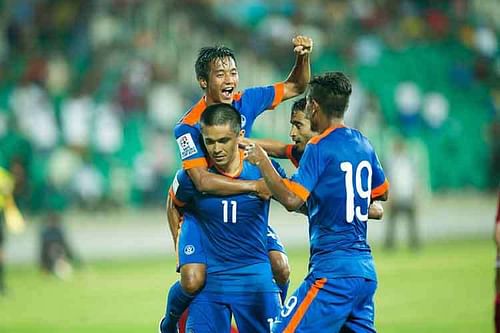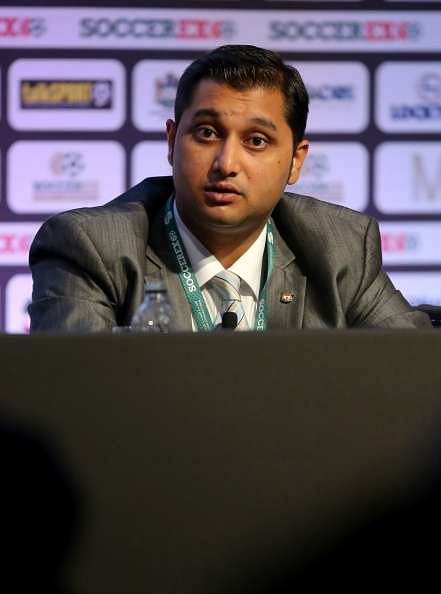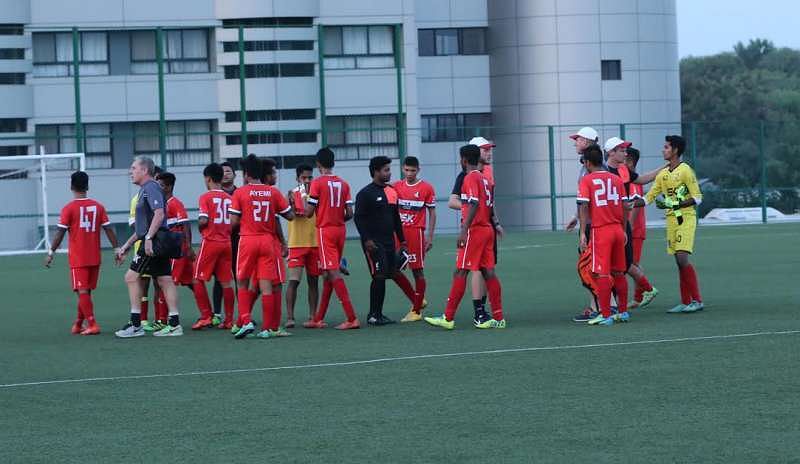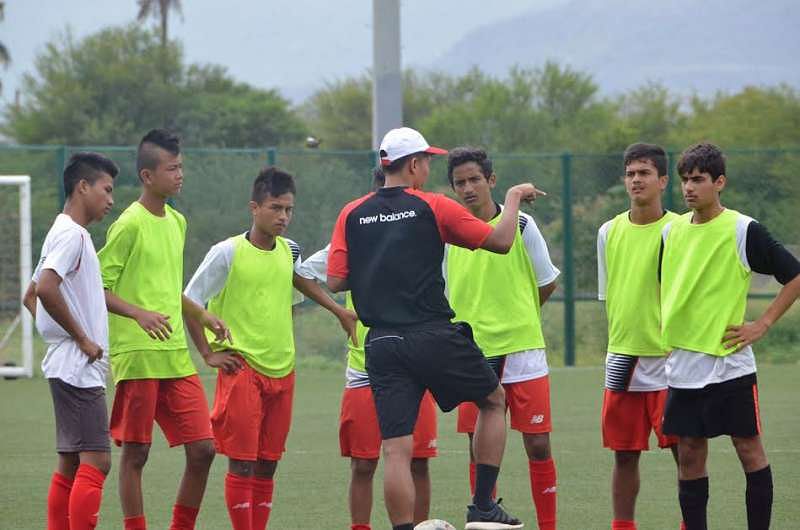
The DSK Shivajians Story: An inspiration for Indian football
As no. 43 received the ball on the right wing, you could sense the excitement of the crowd turn up a notch. With the ball stuck to his left boot, he trundled along for a bit before turning it on. Injecting some urgency into his dribbling, he pulled out a couple of fantastic stopovers that left the Nepalese right back tasked with stopping him, befuddled.
Cutting in sharply to the left- picture Arjen Robben here and you know what I am talking about – he unleashed a powerful shot that screamed into the top far corner. The goalkeeper dived, but he might as well have saved his energy – no goalkeeper on the planet would have saved that.
Mobbed by his teammates, he was hoisted onto the back of the great Sunil Chhetri who gave him a piggyback ride and allowed the 18-year old lad from Mizoram to lap up the applause.
The young man had scored earlier in that game – becoming India’s youngest ever goalscorer in the process, beating the great Bhaichung Bhutia’s record– but it was his second goal that showcased just how talented Lallianzuala Chhangte was.
The football-appreciating crowd in Thiruvananthapuram knew they had seen something special. Meanwhile, 1500-odd kilometers away, in Pune, Shirish Kulkarni jumped off his couch – a wave of sheer joy overtaking his very being.
You see, Chhangte’s goal had its origins in a dream that Kulkarni had worked his whole life for.
The DSK Shivajians Academy
Shivajians started off as a community club, based out of Pune, way back in 1987. Kulkarni had played for the club in his youth. On growing up, however, he didn't let the realities of life let him forget his love for football. Around two and a half years back he took charge of the club, rebranded it as DSK Shivajians and started building a footballing community based on grassroots development.
The bedrock of this community is the Liverpool FC International Academy – DSK Shivajians, an academy built in association with the most successful English club in Europe, and staffed with coaches from their reputed youth system. With a scouting system that permeates every nook and cranny of our vast nation, it was the first time that a Provate Entity took it upon themselves to promote footballing talent in the country, at least in such a manner.
The aforementioned Lallianzuala Chhangte is a product of that academy, and that in itself speaks volumes about the good work they are doing in Pune. Another young lad Jerry Mawihimingthanga has also played for India – 2 internationals in just over 2 years is something that is greatly creditable. The craziest thing about that? They hadn’t even made the jump to the DSK Shivajian’s first team!
The Academy – and the Pre-Season tournament that they conduct, the DSK Cup (which just concluded its third season) - is at the heart of everything they do at DSK.
“The success of the Academy is critical to the success of the club as it helps us feed quality players up into our senior team, keep our player acquisition costs down and generate revenue through player transfers and sales”, said Kulkarni in an exclusive with Sportskeeda.
Besides this, he believes that his initiative can act as an inspiration to the national footballing scene
“It also creates a model case study that hopefully other Indian football investors will look to emulate in the future as we collectively attempt to develop the sport in this country. Over the next 3 – 5 years, we will solidify our player pathway pyramid and continue to work with our technical partner Liverpool FC to strengthen the systems and processes of the residential Academy to meet top international standards”
It is this focus on sustainable development that has marked DSK out on the national stage which is infamous for a harsh, hostile, environment where clubs find it exceptionally hard to keep themselves going.
The DSK Cup and their Sustainable Model
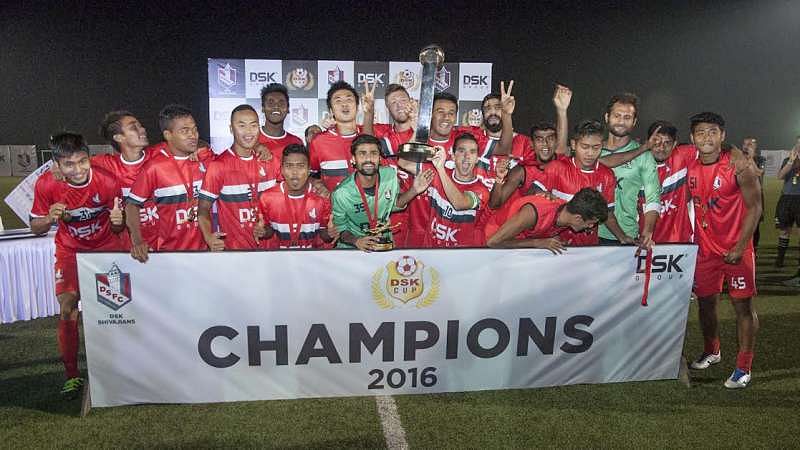
Take the DSK Cup for instance, where the DSK Shivajians also fielded their U18 side along with their senior side, to go toe to toe with the best clubs in the country. A youth system, and a platform for the youth to showcase their talent is essential for the growth of any sport, but even here Kulkarni has had to face numerous hurdles.
“The primary challenge is scheduling. With local leagues such as the Goa Pro league, the Calcutta Football League, the Mizoram Premier League, and so on taking place around the same time, it is difficult to identify a window which works for I-League and I-League 2 clubs to come out to Pune for the tournament,” he says.
Sponsorships, a word rarely heard in Indian football, at least outside the ISL are an issue here as well.
“Another challenge is securing sponsors to financially support the property. Finally, we found that generating high levels of national and local media coverage of the tournament can be a difficult as the event is running parallel to the highly visible Indian Super League.”
The greatest challenge he faces though is one that every Indian football aficionado will be familiar with – getting purchase in the minds of the public where football isn’t really the go-to sport.
This affects every aspect of the football business - “A major challenge is putting together and following a 5 year business plan for the organisation when there is lack of clarity around the national football roadmap” he says before adding that “another challenge is opening up new and impactful revenue generation streams for the club as most of the traditional ways of generating revenue are not too relevant within the current Indian football landscape”
One challenge that most of us overlook though is the availability of qualified professionals – “it can be difficult to attract and retain highly qualified sports marketing professionals when there are other better paying and more secure industries for them to join.”
He doesn’t believe in giving up, though. Kulkarni didn't get to where he was without learning a thing or two about perseverance. The thing that keeps him going? The impact that sport can have on the youth of today.
“Sports can play a vital role in the development of a young person’s confidence, physique and ability to express his or herself. As a young boy, sports served as my access to so many positive aspects of life, most notably the extraordinary feeling of being a part of a team of individuals all working hard for each other.”
The Shivajians have showed India that building a sustainable football business model is not a myth and that in itself is a grand victory for Shirish Kulkarni.
